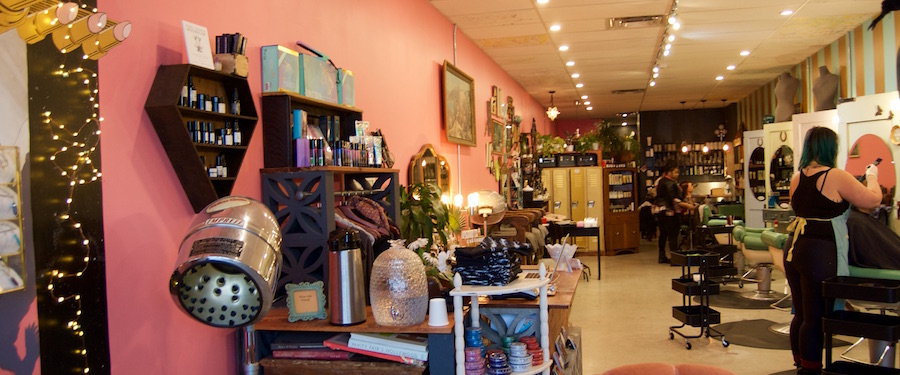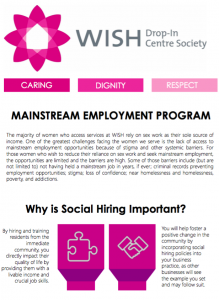Vancouver beauticians say social-hiring creates a city that looks and feels good
East Vanity Parlour recently signed on as WISH Drop-in Centre Society’s first social-hiring partner
An east Vancouver salon is giving some of the city’s most vulnerable people new options that go far beyond a cut and colour.
Instead, some women are gaining job experience that gives them options outside of sex work. It’s part of a supportive employment initiative by WISH, a Downtown Eastside (DTES) support centre for sex workers.
East Vanity Parlour recently signed on as WISH Drop-in Centre Society’s first social-hiring partner and is currently employing one program participant.
The decision was a no-brainer for salon owner and self-professed boss lady Kristi Johanson.
“You can really feel how important it is for this person to have a safe environment where people are here to support and help,” she said. “It’s a safe space for them to learn and just be.”

WISH considers employees’ skills and goals before recommending them to businesses. The organization provides ongoing support throughout hiring and employment to ensure the program is mutually beneficial to both employer and employee.
A supportive environment is key to helping people transition out of the sex trade, say those who have exited.
“In a supportive employment program where you’re going in and they know you’re transitioning out of sex work or you’re supplementing your sex work income, you don’t have to hide who you are — which is a lot more valuable than having to fake it in the straight world where you’re constantly terrified of slipping up,” said Kerry Porth, a former sex-trade worker who is now a community developer and advocate for sex worker rights.
Overwhelming barriers
Some DTES businesses have successfully adopted supportive employment policies. PHS Community Services opened East Van Roasters in 2013 to provide job training for women living in the Rainier Hotel.
But finding more local businesses to fill entry-level positions with social hires hasn’t been easy. WISH program co-ordinator Eva Ureta approached 20 businesses before finding one partner — East Vanity, a 10-year-old business that moved from Mount Pleasant to east Vancouver in March.
Those odds exemplify the barriers that face sex trade workers looking for employment options.
“There’s a lot of stigma with sex work when it comes to getting a job,” said Ureta. “Not having current work history, not knowing how to type a resume — all these things are enough to just say ‘nope, I’m going to stay in the line of work that I’m doing.'”

Although not all sex workers want to exit the trade, mainstream work can provide a financial cushion that allows them to turn down risky dates.
Mainstream work is the last step in WISH’s three-tiered supportive employment program. For Ureta, it’s frustrating to see people who have worked through homelessness, addiction and mental health issues be denied jobs because of resume gaps.
“It’s businesses like East Vanity that offer up the infrastructure and mentorship and the safe, supportive non-judgmental atmosphere that really is the million-dollar deal for people in the community,” she said.
This isn’t the first time that Vancouver beauticians have supported vulnerable communities. The Beauty Night Society was founded 17 years ago to provide services including makeovers to women living in poverty.
Beauty Night founder Caroline MacGillivray says the beauty industry is uniquely suited to provide outreach because it involves therapeutic touch, creativity and communication.
Many Beauty Nights and WISH participants return to volunteer at the organizations who offered them support and even transition to paid positions with other non-profits.
For MacGillivray, the connection between self-care and change isn’t surprising. “When people feel good they start believing that other types of change are possible,” she said. “You help one person at a time and experience a ripple effect.”
Advocates hope that the ripple effect will extend to other Vancouver employers.
[toggle title=”Infographic: Sex work transitions“]
Everyone benefits
Johanson said that two months in, East Vanity is already benefitting from the partnership.
“A product line that we carry has asked what they can do to help, guests hear about the partnership and are moved and want to bring more business here — it opens up your world to more kindness and community, it gives back in so many ways,” she said.
WISH Executive director Mebrat Beyene said social-hiring programs help the whole city.
“Supportive employment enhances employability, it increases women’s self-reliance, independence and economic stability so that it’s less of a reliance on social services,” she said.
Sex workers’ rights advocate Kerry Porth agreed. “I think people recognize that street-based sex work is possibly the most dangerous occupation in Canada.”
“There’s a lot of street-based sex workers who are okay with where they are right now, but there’s a lot who are not,” she said. “If we can expand women’s options — and all women’s options, particularly the most marginalized — then we’re doing better.”
